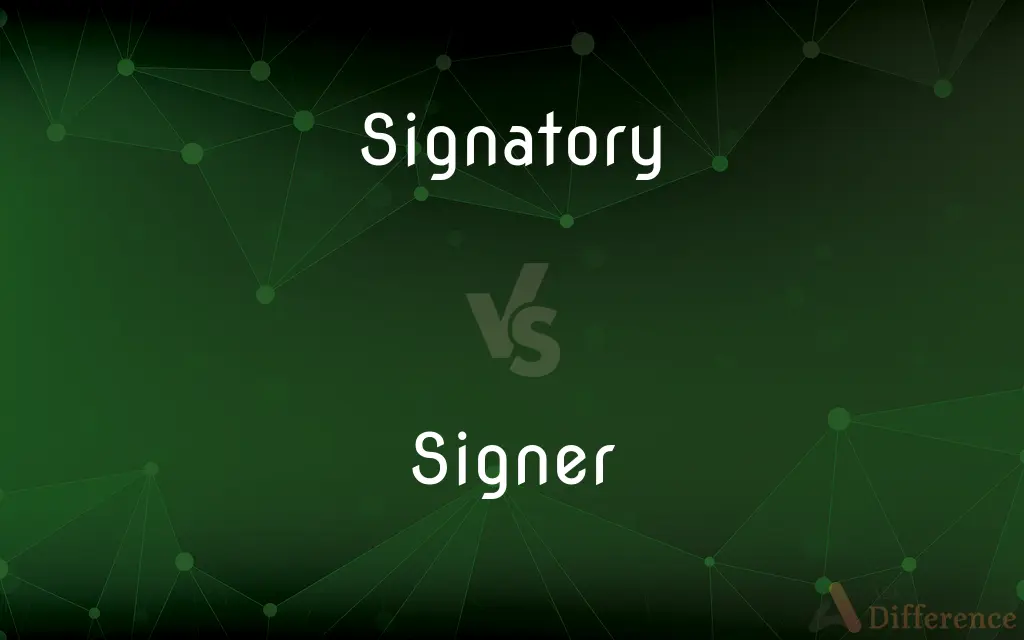Signatory vs. Signer — What's the Difference?
By Tayyaba Rehman — Updated on November 5, 2023
Signatory is a party that has signed an agreement, especially a country that has signed a treaty. Signer is someone who signs a document.

Difference Between Signatory and Signer
Table of Contents
ADVERTISEMENT
Key Differences
Signatory and Signer have distinct connotations though both involve the act of signing. A signatory is often used in formal contexts and refers to a person or entity that is a party to a contract or treaty. It implies a level of authority or responsibility in the agreement being signed. The term signatory is commonly applied in legal and diplomatic circles, indicating an individual or nation that has agreed to be bound by the terms of a specific document.
A signer, meanwhile, is any individual who signs a document but does not necessarily carry the same weight of authority or commitment to an agreement as a signatory. The term is more generic and can apply to anyone who marks a document with their signature for various purposes. A signer may simply be authorizing a transaction, acknowledging receipt of goods, or indicating their presence.
When a nation becomes a signatory to an international treaty, it is taking on legal obligations. The signatory is making a public commitment to uphold the treaty's terms. In contrast, an individual might be a signer on a delivery receipt, which does not carry the same level of commitment or imply any ongoing obligations beyond the act of receiving the goods.
In a business contract, all parties involved are signatories because their signature denotes agreement and obligation to the contract's terms. However, an employee who signs to confirm they have read a company policy is merely a signer; they are not becoming a party to an agreement but merely acknowledging the information.
Signatories are not just signers; they are integral to the existence and validity of a contract or treaty. Their signature represents a consensus and a formalized intention. A signer may not change the status of a document simply by adding their signature. Their act of signing may be necessary, but not necessarily imbued with the authority to enact, validate, or agree to terms within a document.
ADVERTISEMENT
Comparison Chart
Definition
A party that has signed an agreement or treaty.
Any individual who signs a document.
Connotation
Formal, often implies authority or obligation.
General, no implied authority or obligation.
Context
Legal, diplomatic, contractual.
Any context where a signature is required.
Implication
Commitment to terms of the document signed.
May simply acknowledge or authorize.
Example Usage
Countries are signatories to the Paris Agreement.
An employee is a signer of a delivery receipt.
Compare with Definitions
Signatory
A person who has signed a formal agreement.
The treaty was invalid until the last signatory added their signature.
Signer
A person who signs to indicate agreement or acknowledgment.
As the signer of the letter, he agreed to the terms outlined.
Signatory
An individual who signs and is bound by a legal document.
She was a signatory to the lease, holding responsibility for the rent.
Signer
Any individual who signs a written instrument.
The signer was required to initial each page of the contract.
Signatory
One who signs a treaty or international accord.
The nation became a signatory to the human rights convention last year.
Signer
Something that suggests the presence or existence of a fact, condition, or quality
A high temperature is a sign of fever.
Signatory
An entity that is a party to a contract.
As a signatory, the company was obliged to follow the agreement's clauses.
Signer
An act or gesture used to convey an idea, a desire, information, or a command
Gave the go-ahead sign.
Signatory
A party that has formally endorsed a document.
The organization was a signatory to the global environmental pledge.
Signer
Sign language.
Signatory
A party that has signed an agreement, especially a state that has signed a treaty
The signatory states
Britain is a signatory to the convention
Signer
A displayed structure bearing lettering or symbols, used to identify or advertise a place of business
A motel with a flashing neon sign outside.
Signatory
Bound by signed agreement
The signatory parties to a contract.
Signer
A posted notice bearing a designation, direction, or command
An EXIT sign above a door.
A traffic sign.
Signatory
One who has signed a contract or other legal document as a party.
Signer
A conventional figure or device that stands for a word, phrase, or operation; a symbol, as in mathematics or in musical notation.
Signatory
A country that is a party to a treaty.
Signer
Pl. sign An indicator, such as a dropping or footprint, of the trail of an animal
Looking for deer sign.
Signatory
One who signs or has signed something.
Signer
A trace or vestige
No sign of life.
Signatory
Relating to a seal; used in sealing.
Signer
A portentous incident or event; a presage
Took the eclipse as a sign from God.
Signatory
Signing; joining or sharing in a signature.
Signatory powers
Signer
(Medicine) An objective finding, usually detected on physical examination, from a laboratory test, or on an x-ray, that indicates the presence of abnormality or disease.
Signatory
Relating to a seal; used in sealing.
Signer
One of the 12 divisions of the zodiac, each named for a constellation and represented by a symbol.
Signatory
Signing; joining or sharing in a signature; as, signatory powers.
Signer
To affix one's signature to
Signed the letter.
Signatory
A signer; one who signs or subscribes; as, a conference of signatories.
Signer
To write (one's signature)
Signed her name to the contract.
Signatory
Someone who signs and is bound by a document
Signer
To approve or ratify (a document) by affixing a signature, seal, or other mark
Sign a bill into law.
Signer
To hire or engage by obtaining a signature on a contract
Signed a rookie pitcher for next season.
Sign up actors for a tour.
Signer
To relinquish or transfer title to by signature
Signed away all her claims to the estate.
Signer
To provide with a sign or signs
Sign a new highway.
Signer
To communicate with a sign or signs
Signed his approval with a nod.
Signer
To express (a word or thought, for example) in a sign language
Signed her reply to the question.
Signer
To consecrate with the sign of the cross.
Signer
To make a sign or signs; signal.
Signer
To communicate in a sign language.
Signer
To write one's signature.
Signer
One who signs something.
John Hancock is a famous signer of the Declaration of Independence.
Signer
One who uses sign language.
Signer
One who signs or subscribes his name; as, a memorial with a hundred signers.
Signer
Someone who can use sign language to communicate
Signer
Someone who signs and is bound by a document
Signer
Someone who writes their name on a document.
The signer of the check must be an account holder.
Signer
One who provides a signature for administrative purposes.
She was the designated signer for receiving packages.
Signer
A person who uses sign language.
The signer communicated the speaker's words to the audience with great skill.
Common Curiosities
Is every signer a signatory?
No, not every signer is a signatory. Signers do not necessarily carry legal obligations beyond the act of signing.
Who is considered a signatory?
A signatory is a person or entity that has signed and is legally bound by a contract or treaty.
Can a signatory be an organization?
Yes, an organization can be a signatory if it enters into a formal agreement or treaty.
Is a signer on a petition the same as a signatory?
No, a signer on a petition is not a signatory, as there is no legal obligation involved.
Are witnesses to a signature considered signers or signatories?
Witnesses are considered signers, as they are not parties to the agreement itself.
Can anyone be a signer?
Yes, any individual who signs a document is a signer, regardless of the document's nature.
Does a signatory have more responsibility than a signer?
Yes, a signatory usually has more responsibility, as it implies a commitment to the terms of an agreement.
Are electronic signatures valid for signatories?
Yes, electronic signatures are legally valid for signatories if they comply with relevant laws.
Can a signer be held accountable for the contents of a document?
It depends on the context. If they are merely acknowledging receipt, then no. If it's a contract, they may have responsibilities.
Is the president of a country a signer or a signatory when ratifying a treaty?
The president is a signatory, as this involves a formal commitment to a treaty's terms.
Does the role of a signer extend beyond the act of signing?
Typically, the role of a signer does not extend beyond the act of signing unless specified by the document.
Do signatories have to sign in their official capacity?
Typically, yes. Signatories sign in an official capacity, representing themselves or an entity in an agreement.
Must a signatory be aware of the document's content?
Yes, a signatory must be aware of and agree to the document's content.
Can a signer withdraw their signature?
It depends on the document and circumstances, but usually once a document is signed, the signature is binding.
Can a minor be a signatory?
Generally, minors cannot be signatories as they do not have the legal capacity to enter into most agreements.
Share Your Discovery

Previous Comparison
Repentant vs. Penitent
Next Comparison
Vapour vs. VaporAuthor Spotlight
Written by
Tayyaba RehmanTayyaba Rehman is a distinguished writer, currently serving as a primary contributor to askdifference.com. As a researcher in semantics and etymology, Tayyaba's passion for the complexity of languages and their distinctions has found a perfect home on the platform. Tayyaba delves into the intricacies of language, distinguishing between commonly confused words and phrases, thereby providing clarity for readers worldwide.














































